| Kindle 価格: | ¥2,198 (税込) |
| 獲得ポイント: | 22ポイント (1%) |

無料のKindleアプリをダウンロードして、スマートフォン、タブレット、またはコンピューターで今すぐKindle本を読むことができます。Kindleデバイスは必要ありません。
ウェブ版Kindleなら、お使いのブラウザですぐにお読みいただけます。
携帯電話のカメラを使用する - 以下のコードをスキャンし、Kindleアプリをダウンロードしてください。

The Rational Optimist: How Prosperity Evolves (P.S.) (English Edition) Kindle版
“A delightful and fascinating book filled with insight and wit, which will make you think twice and cheer up.” — Steven Pinker
In a bold and provocative interpretation of economic history, Matt Ridley, the New York Times-bestselling author of Genome and The Red Queen, makes the case for an economics of hope, arguing that the benefits of commerce, technology, innovation, and change—what Ridley calls cultural evolution—will inevitably increase human prosperity. Fans of the works of Jared Diamond (Guns, Germs, and Steel), Niall Ferguson (The Ascent of Money), and Thomas Friedman (The World Is Flat) will find much to ponder and enjoy in The Rational Optimist.
For two hundred years the pessimists have dominated public discourse, insisting that things will soon be getting much worse. But in fact, life is getting better—and at an accelerating rate. Food availability, income, and life span are up; disease, child mortality, and violence are down all across the globe. Africa is following Asia out of poverty; the Internet, the mobile phone, and container shipping are enriching people's lives as never before.
An astute, refreshing, and revelatory work that covers the entire sweep of human history—from the Stone Age to the Internet—The Rational Optimist will change your way of thinking about the world for the better.
この本を読んだ購入者はこれも読んでいます
 Antifragile: Things That Gain from Disorder (Incerto Book 3) (English Edition)Nassim Nicholas TalebKindle版
Antifragile: Things That Gain from Disorder (Incerto Book 3) (English Edition)Nassim Nicholas TalebKindle版 Skin in the Game: Hidden Asymmetries in Daily Life (Incerto) (English Edition)Nassim Nicholas TalebKindle版
Skin in the Game: Hidden Asymmetries in Daily Life (Incerto) (English Edition)Nassim Nicholas TalebKindle版
商品の説明
レビュー
著者について
登録情報
- ASIN : B003QP4BJM
- 出版社 : HarperCollins e-books; Illustrated版 (2010/6/10)
- 発売日 : 2010/6/10
- 言語 : 英語
- ファイルサイズ : 2659 KB
- Text-to-Speech(テキスト読み上げ機能) : 有効
- X-Ray : 有効
- Word Wise : 有効
- 付箋メモ : Kindle Scribeで
- 本の長さ : 466ページ
- ページ番号ソース ISBN : 0007267126
- Amazon 売れ筋ランキング: - 239,412位洋書 (洋書の売れ筋ランキングを見る)
- カスタマーレビュー:
著者について

著者の本をもっと発見したり、よく似た著者を見つけたり、著者のブログを読んだりしましょう
-
トップレビュー
上位レビュー、対象国: 日本
レビューのフィルタリング中に問題が発生しました。後でもう一度試してください。
ボリュームがありつつも、飽きがこない話題が続いて何度でも読みかえしたい内容です。
他の著作も読んでみたい。
(1)交易と、(2)交易と裏腹の専門化と、(3)多くの専門化による集合知とによって、我が種族 Homo Sapiensは他よりも文明を発達させ他を圧倒して来たという史観で、先史時代から現代に至る人類の歴史を丁寧にたどる。それが全11章のうち8章を占める。
9-11章は過去数十年の悲観論の予想が悉く当たらなかった事実を指摘する。'60年代には人口増加/飢饉の悲観論が盛んになり、'70年代は(ローマクラブを初め)資源枯渇、'80年代は酸性雨、'90年代はAIDS/SARSなどの疫病、'00年代は温暖化の悲観的な将来が語られた。しかし人類は集合知で問題を解決する力があり、温暖化はまだ残問題だがその他は結局悲観論で予見された危機には至らなかったとデータで示す。その実績から、開発から取り残されたアフリカ問題も、温暖化を含む気候問題も人類は解決できるはずだという。だから表題の「合理的楽観論者」なのだ。
気に入らない読者も居ると思うが、「風力とかバイオマスとか自然エネルギーに気を散らしても解決にならないから、化石燃料と原子力主体で考え、二酸化炭素吸収が経済的になる環境を整えれば、必ず人類は吸収に成功する」とデータに基づいて楽観論を展開する。もちろん福島以前の著作だが、Chernobylですら大騒ぎしたが実害は大したことはなかったと主張する。
私はKindleで読んだ。何しろ分厚い本で、読んでも読んでも進まないことにヘキヘキしたが、内容は平易で面白く退屈はしなかった。著者の英国人は天才だと思う。古今の文献・データに通じ、参考文献は文字数で本の1/3を占める。加えてLinuxからFacebookまでに通じている。
新しい視点・史観を与えてくれる本として高く評価したい。
他の国からのトップレビュー
2023年12月4日にスペインでレビュー済み

Ridley n’a pas de mots trop durs contre les pessimistes tels que Paul Ehrlich, qui ne cessent de prédire le malheur et la morosité et ne reviennent jamais sur leurs propos lorsque leurs prédictions alarmistes ne se matérialisent pas. Selon lui, les pessimistes basent leurs projections sur des tendance à court terme dont ils font des projections linéaires, sans tenir compte des évolutions et ruptures dues à l'innovation humaine. Le livre regorge de données historiques chiffrées, de faits et d'anecdotes pertinentes. Quelques exemples :
- Actuellement, le Sud-Coréen moyen vit 26 ans de plus et gagne 15 fois son salaire de 1955.
- L’achat d’une Ford modèle T en 1908 coûtait à 4’700 heures de travail; de nos jours, une voiture bien plus luxueuse peut être achetée pour 1’000 heures de travail.
- Aux États-Unis, en 1915, un tiers des terres agricoles était utilisé pour nourrir 21 millions de chevaux, occupés à divers travaux, en ville et à la campagne; le progrès technique (tracteurs, engrais) a libéré ces terres pour une utilisation plus efficace.
- En Chine, après 50 ans d’une politique de l’enfant unique extrêmement contraignante, le taux de natalité est passé de 5,59 à 1,73 enfants par femme. Durant la même période, avec une politique libérale de développement, le Sri Lanka, grâce à une amélioration du bien-être matériel de sa population, est parvenu à un résultat quasi identique (passant de 5,70 à 1,88 enfants par femme) sans mesure autoritaire du gouvernement.
Riche de nombreuses informations et basés sur des faits avérés, ce livre se lit très facilement, on reconnaît le journaliste à l'aise dans la compilation et dans la communication. Vous l’aurez peut-être deviné, Matt Ridley est libertarien et… favorable au Brexit. ^^
Le prologue de The Rational Optimist, "When Ideas Have Sex", est devenu une conférence TED de 16 minutes, disponible sur YouTube. Ridley y donne un petit cours d’économie plein d’humour dans lequel il cite avec à propos les deux pères de l’économie classique, Adam Smith et David Ricardo.
Et pour finir, la citation de La Richesse des Nations, de Adam Smith, en exergue du livre :
"The division of labour, from which so many advantages are derived, is not originally the effect of any human wisdom, which foresees and intends that general opulence to which it gives occasion. It is the necessary, though very slow and gradual consequence of a certain propensity in human nature which has in view no such extensive utility; the propensity to truck, barter, and exchange one thing for another.
Whether this propensity be one of those original principles in human nature of which no further account can be given; or whether, as seems more probable, it be the necessary consequence of the faculties of reason and speech, it belongs not to our present subject to inquire. It is common to all men, and to be found in no other race of animals, which seem to know neither this nor any other species of contracts."









![反脆弱性[上]――不確実な世界を生き延びる唯一の考え方](https://images-fe.ssl-images-amazon.com/images/I/814wiWXbt6L._AC_UL160_SR160,160_.jpg)


